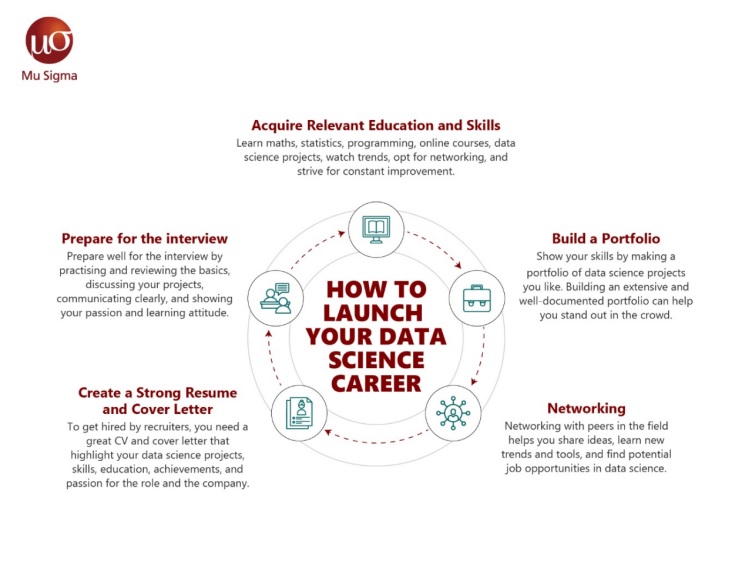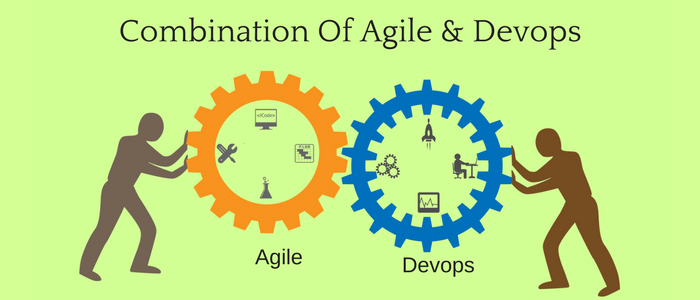How to launch your data science career
If you have decided to plan your career in data science, then there is no better time than now. But, yes, you have to take some necessary steps initially so that you can accelerate your data science career in the future.
Because data science is a vast field, you need to know where you want to go. Which steps should you take, and what to avoid? In this article, you will learn How to effectively launch your career in data science.
Signs that You can become a good data scientist
First things first, Know why you want to choose data science. Do you have any interest or just peer pressure? Here are some signs that data science is the perfect career path for you
Data Curiosity: If you are interested in working with data, analyzing information, and concluding datasets, this might indicate prospective data science interest.
Analytical and problem-solving skills: Data science aficionados frequently possess a keen analytical approach. They enjoy finding solutions, dissecting difficult situations into simpler ones, and utilizing facts to guide their judgment.
Love Coding: Coding and programming abilities are necessary for data science, especially in languages like Python or R. Coders passionate about data science could also love working with algorithms and data manipulation packages.
Desire for Continuous Learning: Because data science is always changing, those interested in working in it frequently hunger for information and are willing to learn new skills.
Data visualization and good communication: Data visualization is a vital component of data science because it makes it easier to convey information effectively. An interest in developing attractive visual representations and communicating the same to other team members with a non-technical data background.
Willingness to Try New Things: Data scientists frequently try new methods and models to identify the best answers. If you are willing to experiment with new techniques and learn from mistakes, you may be interested in a career in data science.
Acquire Relevant Education and Skills:
Building a foundation in maths and statistics is the first step in acquiring essential education and abilities in data science. Through online tutorials or courses, learn programming languages like Python or R. Take online classes from sites like Coursera or DataCamp, or enroll in data science programs.
Participate in data science communities and personal initiatives to gain real-world experience. Observe the most recent trends by reading blogs and trade periodicals. Create a portfolio of your work and think about Networking or taking on internships to obtain professional experience.
Furthermore, you must constantly learn new things and develop your talents to compete in this rapidly changing sector. Discover your specialty by experimenting with several fields since data science blends technological know-how with domain knowledge. You may pursue a lucrative career in data science if you are committed and persistent.
Build a portfolio
After learning and acquiring the necessary skills, you must showcase your skills effectively by building a portfolio. Concentrate on personal data science projects that appeal to you to build an outstanding portfolio.
These projects should analyze various datasets or take on real-world issues to show how you’ve applied data science principles practically. Host your projects on GitHub, a popular collaboration and code-sharing site. Include a thorough README that describes the project’s goals, data sources, methods, and outcomes.
In addition, Documentation is essential; give concise descriptions of your project’s goal, strategy, and results. Create your portfolio to make it simple for visitors to find and comprehend your work. Ensure your code is well-structured, adequately annotated, and follows best practices to emphasize code quality.
Also, Do not forget to include various data science subjects in your portfolio, such as data cleansing, exploratory data analysis, machine learning, and natural language processing. Building an extensive and well-documented portfolio can help you stand out in the crowded area of data science by showcasing your knowledge, originality, and commitment as a data scientist.
Networking With Data Scientists Peers
Networking with peers in the field is crucial if you are an aspiring data scientist. The sharing of ideas, information, and best practices is encouraged via collaboration and connections with others in the sector. In addition, Networking increases your confidence and knowledge; you will know the newest trends, tools, and methodologies in the quickly changing field of data science through Networking with a wide range of people.
As many data science positions are filled through referrals and word-of-mouth recommendations, Networking also opens doors to prospective employment prospects.
Keep Up with Industry Trends
In the fast-paced field of data science, it’s essential for career advancement and success to keep up with market developments regarding tools, technologies, and trends. To adapt to the data analysis landscape, continuous learning is necessary.
The best methods to stay current are to take online courses, watch webinars, and interact with data science forums. Reading trade journals, academic papers, and popular data science blogs can help you stay abreast of recent developments.
Create a Strong Resume and Cover Letter
A great CV and cover letter are essential to get seen and hired by recruiters. So, Highlight the data science projects, professional experience, and educational background.
Customize your CV as per the job description. Add programming skills and understanding of statistics, machine learning, and data visualization. To show the impact of your work, be specific when reporting successes and projects’ measurable results. Every application should have a distinctive cover letter showcasing your enthusiasm for data science and the particular company or position.
Emphasize your love of solving problems and how your abilities fit the company’s objectives. Your passion for data science and why you are a strong candidate for the role are shown in your carefully designed résumé and cover letter.
Interview Preparations
Since data science interviews can be challenging and require technical and soft skills, preparation is crucial. Preparation is the key to acing the interviews. Review the fundamental concepts, mathematical formulae, and common data science methodologies.
Be prepared to discuss your data science activities in-depth, detailing the challenges you faced, the techniques you employed, and the conclusions you came to. Show off your abilities to communicate difficult technological concepts clearly and concisely. Demonstrate enthusiasm for lifelong learning and a willingness to learn from new challenges. If you completely prepare for interviews to show your dedication to and passion for data science, you’ll have a greater chance of landing the desired position.
What to avoid when pursuing a career in data science
Now, you know how you should start your career in data science. But it is also essential to know what to avoid.
Avoid spending too much time on theory: While theory is essential, excessive focus may lead to less practical experience and delay your hands-on skills development.
Refrain from coding every algorithm from scratch: Utilise existing libraries and frameworks to save time and effort, promoting efficiency in the development process.
Don’t rush into advanced topics like deep learning without a solid foundation: Ensure you grasp fundamental concepts well before diving into complex subjects.
Keep technical jargon in your resume to a minimum: Make your resume accessible to non-technical recruiters and the hiring management team to increase your chances of landing interviews.
Don’t overestimate the value of academic degrees: While degrees are valuable, practical experience and real-world projects often carry more weight in data science.
Avoid searching too narrowly for solutions: Embrace diverse approaches and perspectives to solve problems effectively.
Always be prepared to discuss your projects: Showcase your expertise and passion by confidently explaining your contributions and outcomes.
Don’t underestimate the value of domain knowledge: Understanding your domain enhances your ability to derive meaningful insights from data.
Don’t neglect communication skills: Data scientists must effectively communicate their findings to technical and non-technical audiences, making strong communication skills crucial for success.
Conclusion
Starting a career in data science demands commitment, ongoing learning, and initiative. Set yourself up for success and open up a world of options in the fascinating subject of data science by adhering to the advice in this manual. To succeed in this rapidly expanding and significant business, keep your concentration, establish a solid foundation, and develop your talents.





